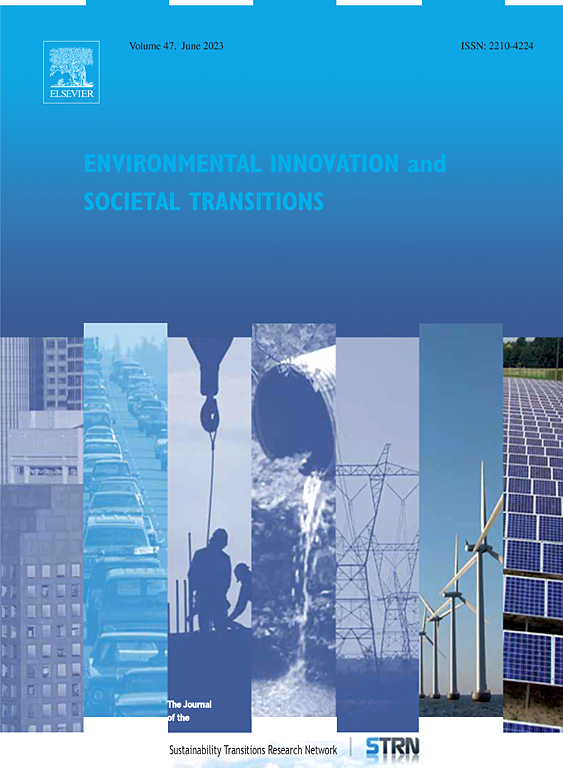"我们不能事必躬亲"。- 瑞典市政当局为何在管理流动性转型时有意促进中介服务
IF 5.7
2区 经济学
Q1 ENVIRONMENTAL SCIENCES
Environmental Innovation and Societal Transitions
Pub Date : 2025-04-19
DOI:10.1016/j.eist.2025.100998
引用次数: 0
摘要
关于转型中的调解的文献强调了公开促进调解的重要性。为了了解是什么驱动当局在财政上促进中介,我们对16个瑞典市政当局进行了探索性研究,应用协作治理驱动因素框架,促进了流动性转型中的中介行为。结果突出了大多数市政当局共同的驱动因素,包括其他管理者对协作挑战的认识,或者他们无法自己开展中介活动。然而,研究结果也揭示了司机的多样性和背景依赖性,导致市政当局对中介机构表达了不同的、部分相互冲突的期望。这些调查结果强调了通过市政当局促进中介作为行政人员和中介机构之间的交易和个人关系的重要性。它们还强调了“情感性工作”对于减轻中介机构所面临的期望多样性所造成的冲突的相关性,以及市政当局在塑造当地中介生态方面的重要性。本文章由计算机程序翻译,如有差异,请以英文原文为准。
“We can’t do everything ourselves.” - Why Swedish municipalities deliberately promote intermediation in governing the mobility transition
Literature on intermediation in transitions has emphasised the importance of publicly promoting intermediation. To understand what drives authorities to financially promote intermediation, we conducted an exploratory study of 16 Swedish municipalities promoting an intermediary actor in the mobility transition, applying the framework of drivers of collaborative governance. The results highlight drivers common to most municipalities, including among others administrators’ awareness of collaboration challenges, or their inability to conduct intermediary activities on their own. However, the results also reveal diversity and context dependency of the drivers, leading to municipalities voicing diverse and partly conflicting expectations towards the intermediary. These findings underline the importance of understanding the promotion of intermediation through municipalities as a transactional and personal relationship between administrators and intermediaries. They also underline the relevance of “affective work” to mitigating conflicts caused by the diversity of expectations facing intermediaries, and the importance of municipalities in shaping local ecologies of intermediation.
求助全文
通过发布文献求助,成功后即可免费获取论文全文。
去求助
来源期刊

Environmental Innovation and Societal Transitions
Energy-Renewable Energy, Sustainability and the Environment
CiteScore
13.60
自引率
19.40%
发文量
90
审稿时长
56 days
期刊介绍:
Environmental Innovation and Societal Transitions serves as a platform for reporting studies on innovations and socio-economic transitions aimed at fostering an environmentally sustainable economy, thereby addressing structural resource scarcity and environmental challenges, particularly those associated with fossil energy use and climate change. The journal focuses on various forms of innovation, including technological, organizational, economic, institutional, and political, as well as economy-wide and sectoral changes in areas such as energy, transport, agriculture, and water management. It endeavors to tackle complex questions concerning social, economic, behavioral-psychological, and political barriers and opportunities, along with their intricate interactions. With a multidisciplinary approach and methodological openness, the journal welcomes contributions from a wide array of disciplines within the social, environmental, and innovation sciences.
 求助内容:
求助内容: 应助结果提醒方式:
应助结果提醒方式:


